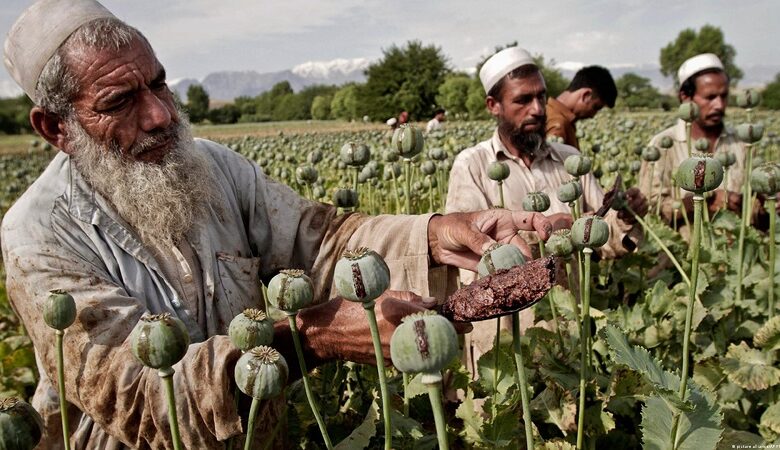Taliban’s Bold Move: Cracking Down on Opium Production in Afghanistan

In a remarkable turn of events, the Taliban, who once relied on the illicit opium trade to fund their insurgency, have taken drastic measures to eliminate poppy cultivation in Afghanistan. This unexpected move has resulted in a significant reduction in poppy fields across the country, with far-reaching consequences for the global opium market and Afghanistan’s economy.
The southern province of Helmand, known as the heartland of Afghanistan’s opium production, has witnessed a staggering decline in poppy cultivation. Satellite imagery provided by the British firm Alcis reveals that poppy cultivation in Helmand plummeted from over 120,000 hectares in April 2022 to less than 1,000 hectares a year later. This dramatic reduction is attributed to anti-poppy units patrolling the province, aggressively enforcing the ban on poppy cultivation.
Similar results have been observed in Nangarhar province, another significant poppy-producing region. Poppy cultivation there has shrunk to a mere 865 hectares, compared to over 7,000 hectares in 2022. David Mansfield, a seasoned researcher of Afghanistan’s illicit economy, estimates that the country’s poppy production will decrease by a staggering 80% between 2022 and 2023.
This crackdown on poppy cultivation is a bold move by the Taliban, given that, before their rise to power in August 2021, Afghanistan accounted for 85% of the world’s opium production. Opium, a gum extracted from poppies, played a pivotal role in financing the Taliban’s insurgency, with the group encouraging farmers to cultivate poppies and taxing the opium trade.
However, the Taliban’s leader, HibatullahAkhundzada, promptly banned narcotics shortly after taking control of the country. Recent evidence from opium-producing regions in southern and eastern Afghanistan indicates that this ban is being rigorously enforced.
The ban’s success in regions like Helmand and Nangarhar bodes well for the Taliban’s commitment to eliminating poppy cultivation. It’s important to note that the ban is harder to implement in remote regions like Badakhshan in the northeast. Nonetheless, the progress thus far is undeniably significant and emblematic of a shift in Afghanistan’s opium landscape.
To comprehend the magnitude of this development, it’s essential to consider the pivotal role opium played in Afghanistan’s economy. In 2021, the opium trade, including poppy cultivation and related activities, contributed an estimated $1.8 billion to $2.7 billion to the country’s income. This amounted to 9% to 14% of Afghanistan’s GDP, surpassing the value of official exports of goods and services. Approximately 450,000 Afghans were employed in various aspects of the opium trade.
The Taliban’s decision to ban poppy cultivation echoes their previous stance in 2000 when they were in power. At that time, they also imposed a ban, leading to a sharp reduction in poppy cultivation from around 82,000 hectares in 2000 to less than 8,000 hectares in 2001. However, the ban was revoked later that year amid the looming threat of invasion by the United States and its allies.
For the following two decades, despite promises of government enforcement and substantial financial investments by Western donors and UN agencies in “alternative livelihoods” programs, Afghanistan experienced a resurgence in opium production. This resurgence was emblematic of the ineffectiveness of the Western-backed development efforts and the fragility of the country’s elected governments, highlighting the opium trade as a symbol of these shortcomings.
Nevertheless, questions remain about the Taliban’s ability to sustain the ban amid Afghanistan’s dire economic situation. The country’s economy contracted by a staggering 35% between 2021 and 2022, and a significant portion of the population requires immediate humanitarian assistance. The loss of employment for thousands of itinerant opium harvesters exacerbates these challenges.
Poppy farmers are growing increasingly frustrated, especially as the price of opium has surged. In parts of southern and southwestern Afghanistan, the price of a kilogram of opium reached almost $360 in November 2022, triple the price from the previous year. There are even speculations in Helmand and Kandahar that the Taliban may be covertly profiting from the ban.
While the ban on poppy cultivation may not have an immediate, substantial impact on the global drug trade due to the availability of cheap synthetic opioids, it is a remarkable development in Afghanistan’s governance. Under Western-backed governments, opium producers largely operated with impunity. Today, however, the Taliban has demonstrated its willingness and capacity to enforce its policies, even when it entails disrupting a significant source of income for the country.
The Taliban’s crackdown on poppy cultivation in Afghanistan is a bold and unexpected move. It has resulted in a substantial reduction in opium production, marking a significant shift in the country’s illicit economy. The long-term success of this ban remains uncertain, but for now, it serves as a testament to the Taliban’s determination to enforce its policies, even when they challenge deeply ingrained economic interests.
News Mania Desk / Agnibeena Ghosh 9th September 2023






